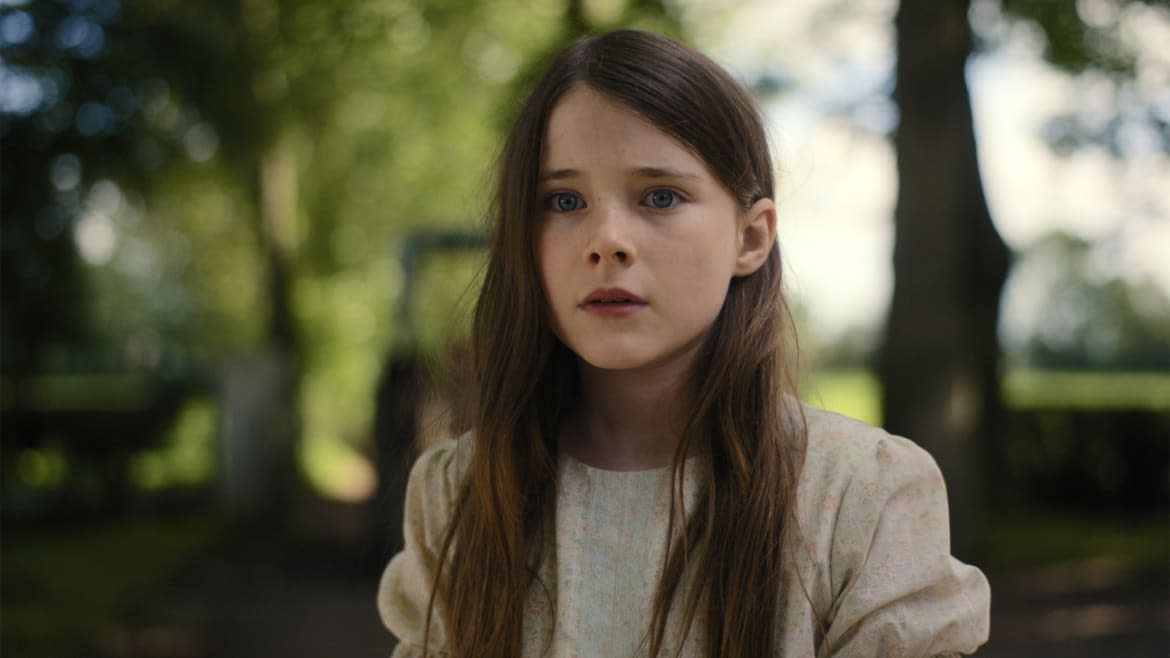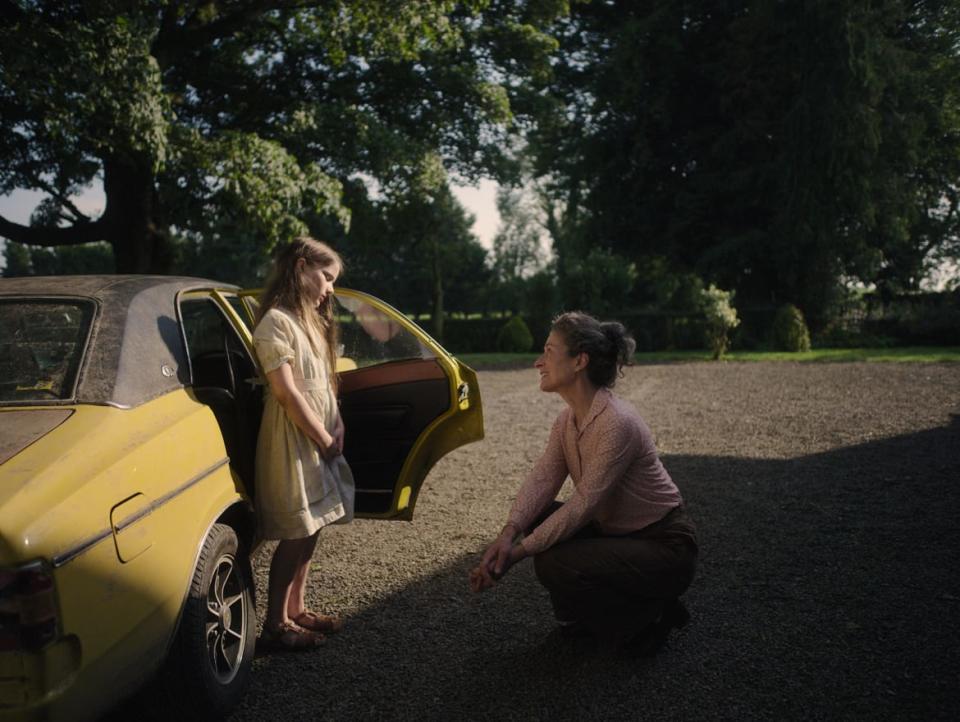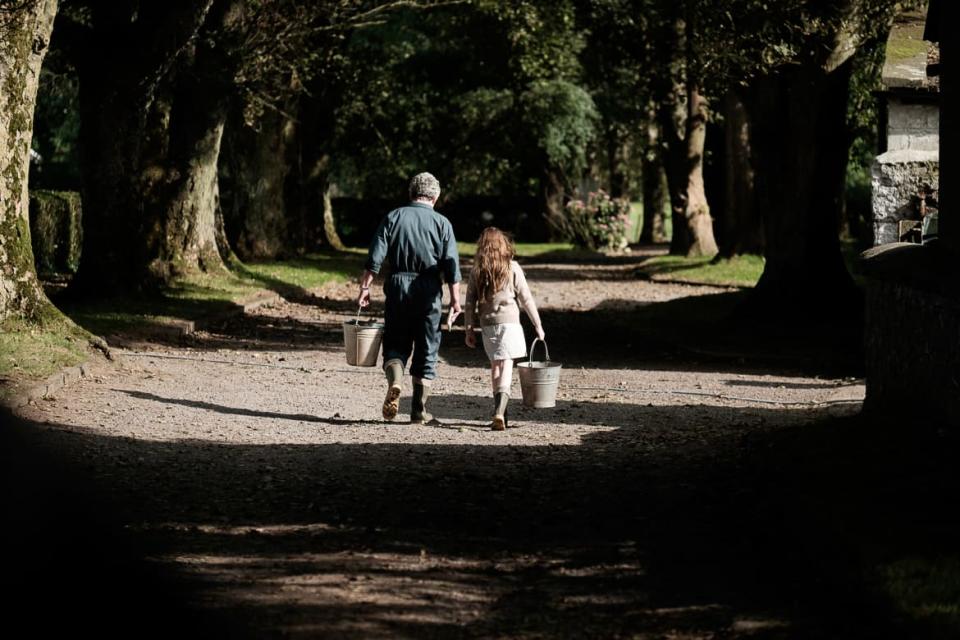‘The Quiet Girl’: The Stunning Irish Film Making Loud, Shocking Oscars History

Nine-year-old Cáit (Catherine Clinch) is one big, long sigh, and The Quiet Girl is a wrenchingly poignant portrait of her sadness, yearning, and rebirth, alongside two adults in need of similar healing.
Adapted from Claire Keegan’s 2010 short story Foster, and competing for Best International Film at this year’s Academy Awards—the first Irish-language film nominated in the category in Oscars history—Colm Bairéad’s contemplative drama is as superb as any feature debut in recent memory, its power derived from its marriage of graceful writing, subtle direction, and unbearably expressive performances. Movies don’t come much more exquisitely heartbreaking than this.
In rural Ireland circa 1981, Cáit hides in the tall grass surrounding the dilapidated home she shares with a pregnant mother (Kate Nic Chonaonaigh), who views her as an annoyance; a derelict drunken-gambler father named Dan (Michael Patric), who treats her as a burden; and multiple siblings, who stare at her with contempt. Cáit’s soft, smooth features, perpetually bowed head, and downcast eyes suggest her intense vulnerability and anguish.
In a series of early, pointed snapshots—of Cáit ducking with shame beneath a bedroom mattress with a wet stain in its center (“There’s muck on your shoe” is all her disgusted mother can utter); reading so slowly in class that the teacher has a fellow student finish the passage aloud; and fleeing school after two boys spill milk on her dress, thereby forcing her to publicly revisit her bed-wetting embarrassment—Bairéad tenderly evokes her isolation, humiliation, and despondency.
Dan refers to Cáit as “the wanderer” to a woman he picks up on the side of the road with whom he’s clearly had prior relations, and yet The Quiet Girl casts her as less a nomad than as simply lost. A gentle and sensitive outsider who doesn’t fit in with her clan, Cáit has withdrawn into herself, and Bairéad’s understated formal schema is wedded to her reserved disposition.
As when Cáit gazes out a car’s backseat window at passing trees set against a blue sky dotted with pillowy clouds, and then turns her attention to the rear shoulder of her father and a handful of cigarette stubs scattered in the vehicle’s ashtray, the director’s images prove intensely attuned to his protagonist’s viewpoint. Whether his camera literally assumes her POV or affixes itself closely to her placid face, the film captures Cáit’s decidedly childlike perspective on her miserable reality. Just as she watches the world with silent attentiveness, so too does Bairéad watch her (and encourage us to do likewise), thereby creating intense, empathetic kinship between audience and character.
By eavesdropping on her callous parents’ conversation, Cáit learns that she’s to be sent to live with strangers for the summer. The nominal reason for this exile is that, with a new baby boy on the way, the struggling family could use some financial relief. Still, there’s no mistaking this as an act of personal rejection.
This is an unthinkable cruelty, and yet it also turns out to be an unimaginable stroke of good luck for Cáit, because she’s put in the care of distant cousin Eibhlín (Carrie Crowley), who, from their first encounter, exhibits a measure of kindness—bending down to greet Cáit face-to-face, and lovingly putting her long locks behind her shoulders—that’s completely foreign to the child. That Eibhlín and her cow-farmer husband Seán (Andrew Bennett) appear to dislike Dan only further warms the girl to her new guardians and, in particular, to Eibhlín, who brushes Cáit’s hair 100 times in a sitting, cuts onions with her at the kitchen sink, and informs her that there are no secrets in this house.

Eibhlín isn’t being completely honest about that last point, but Cáit is too naïve and hurt—and too busy acclimating herself to her new environs—to deduce that the clothes she’s been given to wear (since Dan thoughtlessly drove off with his daughter’s suitcase) might be a sign that Eibhlín and Seán are also quietly nursing still-raw wounds born from a tragedy. The Quiet Girl isn’t about bombshells waiting to detonate, however, but the slow process of rejuvenation that takes place once Cáit settles into this orderly home.
Eibhlín radiates the sort of immediate love for Cáit that only comes from great, painful need, while Seán’s initial remoteness is an analogous manifestation of grief that he doesn’t know how to properly ameliorate. They’re a trio of individuals trying to mend themselves and each other through uneasily forged bonds, and Bairéad dramatizes his action with a light touch, intimating depths via offhand remarks, furtively shared glances, and stunning framing.
Oscars Surprise: What the Hell Is ‘All Quiet on the Western Front’?
It's the last of those that makes The Quiet Girl such a remarkably moving work. A variety of small compositional gestures—Bairéad depicting Cáit’s mother alone (or detached from her daughter) in constricting doorways, and then Cáit and Eibhlín together in them; or two nearly identical shots of Cáit and Seán at the kitchen table, where a slight camera-position adjustment hints at their growing closeness—artfully say all that isn’t articulated aloud.
Bairéad’s script is equally delicate and shrewd, such that Eibhlín softly uttering “your father” conveys a wellspring of resigned, repulsed understanding. There isn’t a single excessive flourish in the film, nor a contrived or manipulative one; from a slow-motion vision of Cáit running to retrieve the mail as Seán times her speed, to a cracked-door glimpse of Eibhlín and Seán embracing, to a brief anecdote about a horse that was found at sea and, upon being rescued, magically came back to life “good as new,” Bairéad’s gem speaks volumes without raising its voice.

The Quiet Girl is awash in lovely, low-key moments, courtesy of not only Bairéad’s expert staging but also his leads’ stellar turns, which use meaningful looks and succinct movements (a raised hand here, a casual caress there) to impart all there is to know about their conflicted characters. Crowley and Bennett are terrific as an older couple attempting to accept and embrace this respite, however brief, from their sorrow, and Clinch is an outright marvel as Cáit, whom she embodies from the inside out, and with a degree of poise and deliberateness that’s breathtaking.
Together, they don’t strike a false note throughout this exceptional film, right up to a finale of such desperate love, distress, fear and acceptance that it earns every one of the many tears it elicits.
Keep obsessing! Sign up for the Daily Beast’s Obsessed newsletter and follow us on Facebook, Twitter, Instagram and TikTok.
Get the Daily Beast's biggest scoops and scandals delivered right to your inbox. Sign up now.
Stay informed and gain unlimited access to the Daily Beast's unmatched reporting. Subscribe now.

 Yahoo News
Yahoo News 
